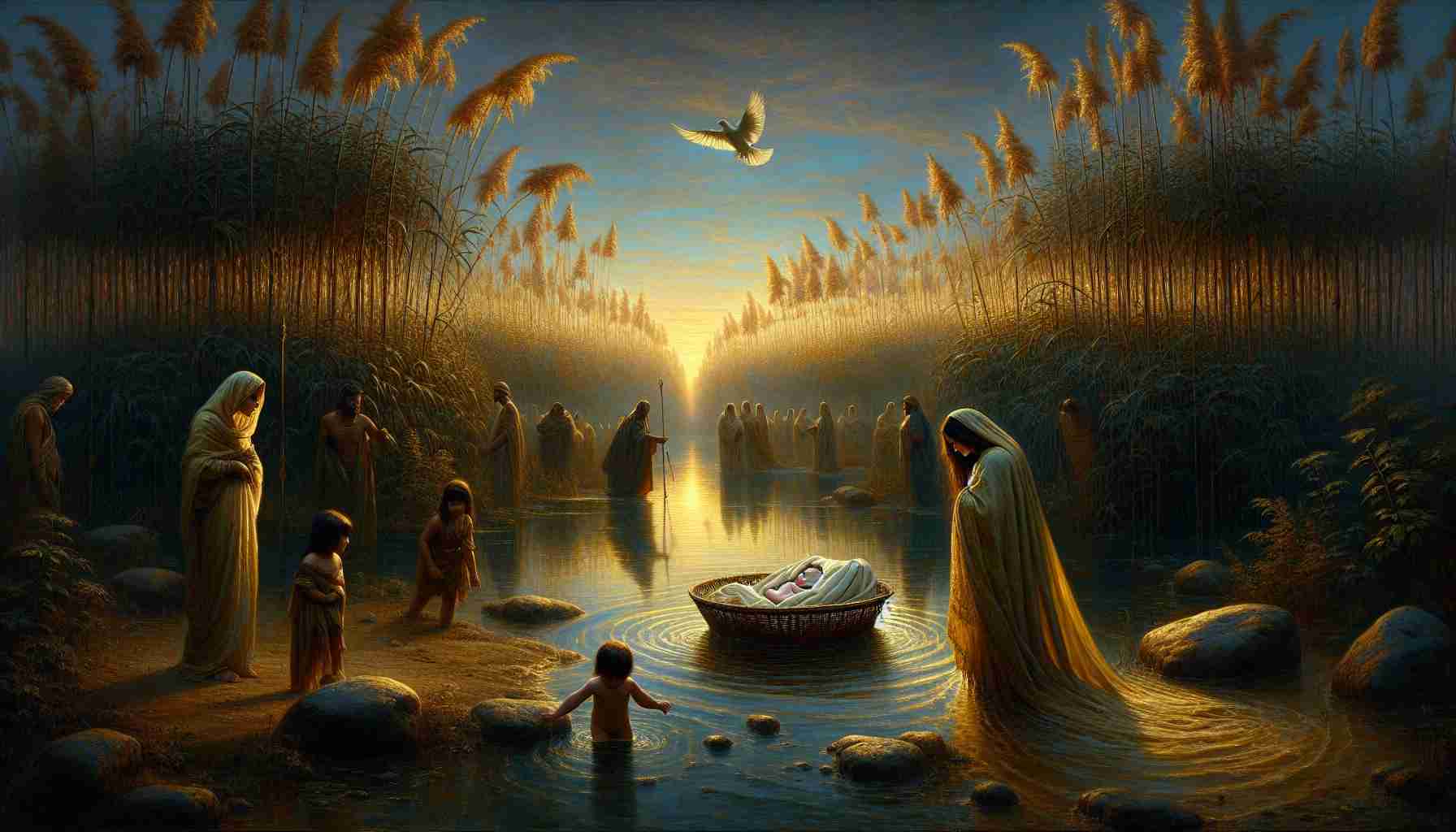

I was the midwife who caught him in my trembling hands.
You won’t find my name in any scroll, but I was there when the boy who would one day break Pharaoh’s power first drew breath in silence. A Hebrew child born in secret, hidden under blankets while soldiers roamed the streets shouting orders. It was the third month of the decree. Pharaoh had commanded that every newborn Hebrew boy be thrown into the Nile River — a death sentence for any child born a son.
I had helped deliver many babies in my years, but none under such fear. When Jochebed, Moses’ mother, cried out in labor, I feared the soldiers would hear her. Her husband, Amram, stood near the door, hands shaking, whispering psalms under his breath. A deep dread hung over us.
When the baby came, there was a pause. He didn’t cry.
I checked him. He was whole—a perfect little boy—swaddled and warm. But not a sound. I leaned close, shaking. Was this mercy? Would silence keep him safe?
Then he let out a cry. Strong. Clear. Much louder than you’d expect from someone so small.
In that moment, something stirred in my soul.
It wasn’t fear.
It was hope.
That cry — full and impossible to silence — echoed through the small room like a shofar on Yom Kippur. Jochebed sobbed, both with relief and terror, kissing her newborn again and again. I looked at the face of that tiny child and felt it like a weight in my chest: Pharaoh may be powerful, but this child... there was something different about him.
Jochebed told me later she saw light fill the room when Moses was born. I didn’t see light — but I saw courage. I watched a mother, risking everything, hide her son for three long months. I watched her surrender that child, placing him in a basket into the Nile itself, the river meant for his death now carrying him to life.
The day she laid him in the water, I stood hidden behind the reeds. My heart split in two as her feet disappeared down the bank. I wanted to cry out. I wanted to stop her. But something in her eyes stopped me—something full of trust. Not in the river. But in God.
That basket floated far from us before it was found by Pharaoh’s daughter. But when I heard her decide to save the Hebrew child, and even hire Jochebed to nurse him, I wept out loud.
God sees. God hears. And God does not ignore the cry of the helpless.
I didn’t know then that Moses would one day return to Pharaoh’s palace and lead us to freedom. But I knew that child’s cry had done more than fill a room.
It woke something in us.
It lit the way to redemption.
I was the midwife who caught him in my trembling hands.
You won’t find my name in any scroll, but I was there when the boy who would one day break Pharaoh’s power first drew breath in silence. A Hebrew child born in secret, hidden under blankets while soldiers roamed the streets shouting orders. It was the third month of the decree. Pharaoh had commanded that every newborn Hebrew boy be thrown into the Nile River — a death sentence for any child born a son.
I had helped deliver many babies in my years, but none under such fear. When Jochebed, Moses’ mother, cried out in labor, I feared the soldiers would hear her. Her husband, Amram, stood near the door, hands shaking, whispering psalms under his breath. A deep dread hung over us.
When the baby came, there was a pause. He didn’t cry.
I checked him. He was whole—a perfect little boy—swaddled and warm. But not a sound. I leaned close, shaking. Was this mercy? Would silence keep him safe?
Then he let out a cry. Strong. Clear. Much louder than you’d expect from someone so small.
In that moment, something stirred in my soul.
It wasn’t fear.
It was hope.
That cry — full and impossible to silence — echoed through the small room like a shofar on Yom Kippur. Jochebed sobbed, both with relief and terror, kissing her newborn again and again. I looked at the face of that tiny child and felt it like a weight in my chest: Pharaoh may be powerful, but this child... there was something different about him.
Jochebed told me later she saw light fill the room when Moses was born. I didn’t see light — but I saw courage. I watched a mother, risking everything, hide her son for three long months. I watched her surrender that child, placing him in a basket into the Nile itself, the river meant for his death now carrying him to life.
The day she laid him in the water, I stood hidden behind the reeds. My heart split in two as her feet disappeared down the bank. I wanted to cry out. I wanted to stop her. But something in her eyes stopped me—something full of trust. Not in the river. But in God.
That basket floated far from us before it was found by Pharaoh’s daughter. But when I heard her decide to save the Hebrew child, and even hire Jochebed to nurse him, I wept out loud.
God sees. God hears. And God does not ignore the cry of the helpless.
I didn’t know then that Moses would one day return to Pharaoh’s palace and lead us to freedom. But I knew that child’s cry had done more than fill a room.
It woke something in us.
It lit the way to redemption.